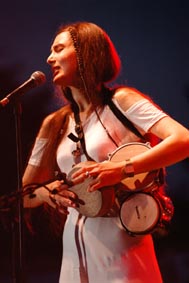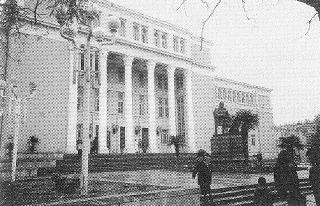![]()
Aziza was born on December 19, 1969, in Baku, the capital of Azerbaijan, into an immensely musical family: Her father, Vagif Mustafa Zadeh, an established Jazz legend throughout the former USSR, of whom BB. King said "people call me the king of the blues, but if I could play the piano like you do, I would call myself God," was a pioneer in as much as he was the first musician to incorporate the traditional music of his homeland, known as "mugam" into popular Western Jazz music. Mugam, itself a highly improvisational style, refers to a modal system of music of which there exist over 70 types, all defined by their specific pattern of intervals, range, as well as direction of melodic movement and rhythm. With her father as architect of the Azerbaijani Mugam Jazz Movement, and her mother Eliza Mustafa Zadeh (in Soviet times known as Eliza Khanom), herself a professional singer and one of the first women to sing in the new Mugam Jazz style, it was only a question of when and how Aziza would express her musical heritage, never an if...


Still, she came a long way from the headstrong child fascinated by any kind of art-form (be it music, dance or painting, but bored and annoyed by her early musical teachers, who demanded more commitment to her practicing) to the disciplined professional pianist/singer/composer. Not that she would have lost any of her self-determination. She always liked to have things her way, a philosophy that did not necessarily go down well with her teachers at Baku conservatory where she received classical piano training. While her all to obvious talent was never under dispute, her handling of musical icons was: neither Aziza's trangressive "additions" to Beethoven Sonatas, nor her improvisations on Bach fugues were very much appreciated. "I'm sure Bach would have agreed with it," she said with a smirk at an interview. It was in this same self-confident fashion that she would later on recruit Jazz celebrities such as Al Di Meola, Stanley Clarke, Omar Hakim or Bill Evans as supporting guests on her CD Dance of Fire. The fact that they all came to play her music is not a small achievement for a then 25 year old, not exactly well-known musician. Asked whether she was in the least intimidated by the famous lot she replies: "No. Not at all. In fact, I think I intimidated them a little. It took a lot of time to record and the music was very different. We had to stay up long hours and even then we recorded for the best part of a month."


In 1989 Aziza left her home Azerbaijan for Germany. At present she lives in Mainz.
COMMENTS - QUESTIONS - SUGGESTIONS